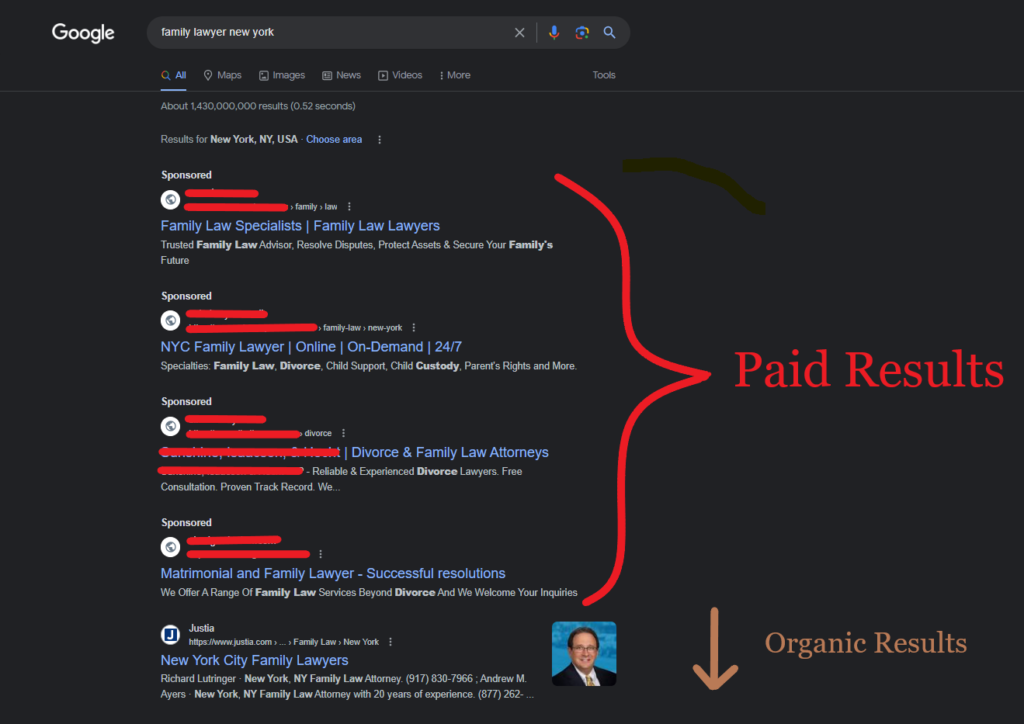4 minute read
In today’s digital age, law firms are constantly exploring new avenues to expand their client base. Two prominent platforms that have gained immense popularity for client acquisition are Google Ads and Facebook Ads. Both platforms offer unique advantages, but understanding which one aligns better with the legal industry’s requirements is crucial. In this comprehensive comparison, we’ll delve into the strengths and weaknesses of each platform to determine which is more effective for legal client acquisition.

1. Targeting Capabilities
Google Ads: Google’s powerful search engine captures users who are actively searching for legal services. With Google Ads, you can target specific keywords related to legal services, ensuring that your ads are displayed to individuals with a high intent to find legal assistance.
Facebook Ads: On the other hand, Facebook offers a wealth of demographic and interest-based targeting options. Law firms can define their audience based on factors like age, location, interests, and even life events. This can be advantageous for reaching individuals who might not be actively searching for legal services but may still require them.
2. Ad Format
Google Ads: Google’s ad format is primarily text-based, appearing at the top of search results. This format is effective for conveying concise information about legal services when users are actively seeking them.

Facebook Ads: Facebook provides a more visually appealing platform with various ad formats, including image and video ads. This can be particularly useful for showcasing success stories, introducing legal teams, and making the firm’s personality shine through.
3. Cost and Budgeting
Google Ads: The cost-per-click (CPC) model of Google Ads means you pay each time a user clicks on your ad. Legal keywords can be highly competitive, leading to potentially higher CPCs. It’s crucial to manage budgets effectively to avoid overspending.
Facebook Ads: Facebook operates on a similar CPC model but generally offers more cost-effective advertising, especially considering its extensive targeting capabilities. Law firms can also set daily or lifetime budgets to maintain control over their advertising expenses.
4. Conversion Tracking
Google Ads: Google provides robust conversion tracking, allowing law firms to measure the effectiveness of their campaigns down to specific actions, such as form submissions or phone calls.
Facebook Ads: While Facebook also offers conversion tracking, it may not provide the same level of granularity as Google Ads, especially when it comes to tracking offline conversions.
5. Trust and Credibility
Google Ads: Many users inherently trust Google’s search results, and appearing at the top through ads can enhance a law firm’s credibility and reputation.
Facebook Ads: Trust on Facebook is built differently. Establishing a strong presence through consistent, informative posts and engaging with the audience can enhance a law firm’s credibility over time.
6. Mobile Experience
Google Ads: With the increasing use of mobile devices, Google Ads capitalizes on mobile searches for immediate legal needs. Ensuring that your ads are optimized for mobile is essential.
Facebook Ads: Facebook’s mobile app offers a vast audience base. Promoting legal services through engaging mobile ads can yield positive results, especially among users who spend significant time on the platform via their mobile devices.
7. Competition and Saturation
Google Ads: Depending on your geographic location and legal specialization, Google Ads can be highly competitive. Achieving top ad placements requires strategic bidding and compelling ad copy.
Facebook Ads: While competition exists on Facebook as well, it might be comparatively less saturated in the legal industry. This could lead to more affordable clicks and better visibility.
8. Ad Approval Process
Google Ads: Google has stringent policies for ads, especially in the legal sector. Ad approval can take time, and violations can result in disapproval or even account suspension.
Facebook Ads: Facebook’s ad approval process is relatively streamlined. However, it’s important to adhere to their guidelines to ensure your legal ads get approved promptly.

9. Remarketing Opportunities
Google Ads: Google allows for powerful remarketing strategies, targeting users who have previously visited your website. This can be particularly effective for legal services, where decision-making might require more time.
Facebook Ads: Facebook’s remarketing capabilities extend beyond its platform. Through the Facebook Pixel, you can track user activity on your website and retarget them with tailored ads.
10. Return on Investment (ROI)
Google Ads: With the right keyword targeting and compelling ad copy, Google Ads can yield high-intent clicks that are more likely to convert, potentially leading to a favorable ROI.
Facebook Ads: Facebook’s cost-effective advertising, coupled with its precise targeting, can also result in a positive ROI, particularly when campaigns are well-crafted and optimized.
Conclusion
In the realm of legal client acquisition, both Google Ads and Facebook Ads offer distinct advantages. Google Ads excels in capturing users with immediate legal needs, while Facebook Ads thrive in targeting a broader audience and building long-term relationships. The choice between the two ultimately depends on the law firm’s goals, target audience, and advertising budget. To maximize results, some firms might find that a balanced approach, utilizing the strengths of both platforms, is the most effective strategy. As the digital landscape evolves, continuous monitoring, testing, and optimization will remain essential to stay ahead in the competitive legal marketing arena.
If you’re intrigued by what you’ve read and eager to delve deeper, we’re just a click away. Reach out to us for a more comprehensive exploration, personalized advice, and strategies tailored to your unique needs. Click here to contact us and take the first step towards transforming knowledge into action!



